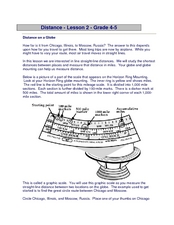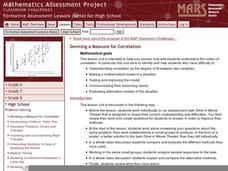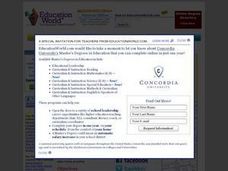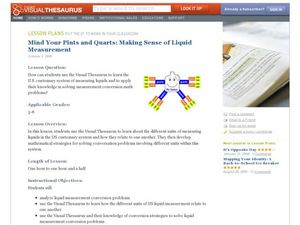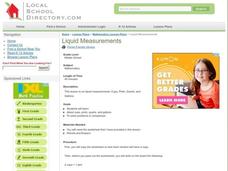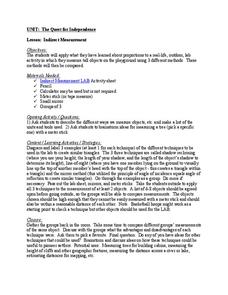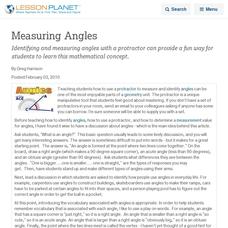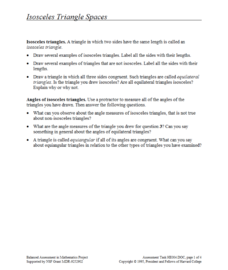Curated OER
Converting Measurements
Sixth graders convert customary linear measurements. They explore using ratios to convert from inches to feet, ounces to pounds, etc. In groups, 6th graders complete conversions. They explain to the class how to solve their problems.
Curated OER
Distance on a Globe
In this world globe worksheet, students read a detailed one page text about how to measure distance on a globe. Students answer 5 questions that will require a globe.
Curated OER
Devising a Measure for Correlation
How well does your class understand the concept of correlation? Use an activity to explore different methods of calculating correlation. Working alone and then in groups, your class will make decisions on what math to apply to the...
Curated OER
Do You Measure Up?
Students measure their height and then they will input the information into a spreadsheet. After the data is entered, students will use the material gathered to create a bar graph showing the heights of people in their class.
Curated OER
Online Math Facts Games
Pupils use online games to reinforce math-facts knowledge, engage in a game the way they might be engaged in an arcade game, and try to be one of the class's top-scorers each week. A good filler or extension activity.
Curated OER
Slides, Flips. Turns......It's All On A Memory Book Page
Fourth graders use tangram sets to investigate the congruence of shapes. They use congruent shapes to demonstrate the properties of slides, flips, and turns. They complete a math journal entry that describes and illustrates each concept.
Curated OER
Mind Your Pints and Quarts: Making Sense of Liquid Measurement
Students convert among liquid measurement units. In this measurement lesson, students use Visual Thesaurus to gather information about customary units for liquid measure such as cup, pint, and quart, then students practice converting...
Curated OER
Long Train: 101 Cars on the Track Lesson Plan
Students practice counting, measuring, and predicting. In this early childhood lesson plan, students identify numbers 1-101, rhyming words, and repetitive words using Long Train by Sam Williams. Students build their recall skills by...
Curated OER
Liquid Measurements
Students explore the concept of liquid measurements. In this liquid measurement instructional activity, students convert liquid measurements from cups, pints, quarts, and gallons.
Curated OER
Indirect Measurement
Learners measure and apply their knowledge of proportion to solve problems. In this geometry lesson, students measure using a meter stick, small mirror and measuring tape. They compare and contrast their measurements to objects outside...
Curated OER
Measuring Temperature
Students examine how to determine temperature on a thermometer. They read and discuss an informational handout, discuss examples of Fahrenheit and Celsius scales, and complete a worksheet.
Curated OER
Measuring Angles
Identifying and measuring angles with a protractor can provide a fun way for students to learn this mathematical concept.
National Nanotechnology Infrastructure Network
Is Measuring an Art or a Science?
Not only do future engineers learn the difference between accuracy and precision, they also get some hands-on experience using different measuring tools.
EduGAINs
Discovery of Pi
Serve up a slice of math for Pi Day! A combination of fun, hands-on lessons and helpful worksheets encourage learners to practice finding the radius, diameter, and circumference of different circles.
West Contra Costa Unified School District
The Power of Ten: Building a Magnitude Model
Add visual representation to teaching place value with a magnitude model. Using adding machine tape, pupils build a linear place value strip from 1 to 100.
EngageNY
Modeling with Polynomials—An Introduction (part 1)
Maximizing resources is essential to productivity. Class members complete an activity to show how math can help in the process. Using a piece of construction paper, learners construct a box with the maximum volume. Ultimately, they...
Teach Engineering
Measuring Surface Tension
How do you measure surface tension? The fifth installment of a nine-part series is an experiment where young scientists use tubes of different sizes to measure surface tension. They calculate the average and standard deviation of the...
Education Closet
Equal Rhythms
Engage young mathematicians in learning about fractions with this cross-curricular math and music lesson. After listening to and repeating different beat patterns, children realize that musical notes are just another way of representing...
National Security Agency
Classifying Triangles
Building on young mathematicians' prior knowledge of three-sided shapes, this lesson series explores the defining characteristics of different types of triangles. Starting with a shared reading of the children's book The Greedy Triangle,...
Teach Engineering
Measuring Viscosity
Groups use a marble to determine the viscosity of household fluids. The procedure calls for pupils to measure the amount of time it takes a marble to fall a specified distance in the fluids. Using unit conversions and algebra, the teams...
Computer Science Unplugged
Twenty Guesses—Information Theory
How do we determine how much information to include and what can be left out? By playing a game of 20 questions, the class generates the best strategies for finding a number. They then move on to guessing the next letter in a short...
EngageNY
Comparison Shopping—Unit Price and Related Measurement Conversions II
Which rate is greater and by how much? Pupils continue to compare rates to solve problems in the 20th portion of a 29-part series. Rates are presented in a variety of representations either using the same representation or different...
Concord Consortium
Isosceles Triangle Spaces
How many different types of triangles can your class name? A discovery lesson guides learners through an exploration of the different triangle types and the relationships between their angles and sides. Using coordinate geometry,...
Mathed Up!
Angles: Parallel Lines
Viewers are presented with seven problems with parallel lines and angle relationships and must use the given information to find the measures of specific angles. To finish, they explain their process in finding the measures in the problems.



